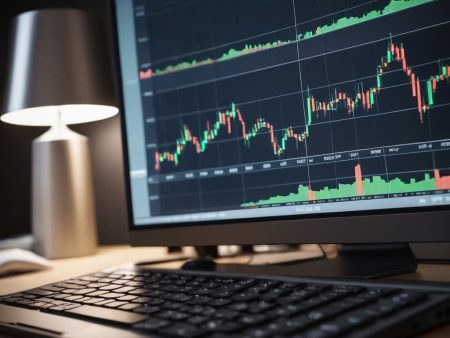How to Start Forex Trading
Getting into forex can be exciting but also a bit overwhelming. It’s a massive market with loads of potential, but success depends on learning the basics, choosing reliable resources, and continuously refining your skills. Here’s a straightforward guide to help you start trading forex.
Getting to Grips with Forex Trading
Forex, or foreign exchange, is all about buying one currency while selling another. These trades happen in pairs like EUR/USD, where you’re trading the Euro (EUR) against the US Dollar (USD). The aim is to profit from changes in the exchange rate. But before you dive in, there are a few key ideas you should understand.
The forex market is the world’s biggest financial market, with daily trades surpassing $6 trillion. It’s open 24/5, offering constant trading opportunities due to global time zones. Unlike stocks, forex trading never really stops, giving you flexibility to trade whenever you like.
Currencies move in small increments called pips—usually 0.0001 for most pairs. Even a small movement can significantly affect your trade, especially if you’re using leverage. Leverage lets you control a larger trade with a smaller amount of money, which can increase your profits but also your risks. So, it’s crucial to get a solid understanding of both the opportunities and risks before making your first trade.
If you’re looking for more information, websites like BabyPips are a great place to start. Or, for insights into current trends, check out FXStreet.
Picking a Good Forex Broker
A crucial early decision is choosing a broker you can trust. Brokers are your gateway to the forex market, so go for one that’s regulated by reputable authorities like the FCA or ASIC. This ensures your funds are in safe hands.
You’ll also want to use a solid trading platform. Many beginners and pros alike use MetaTrader 4 or MetaTrader 5 because they come packed with tools for analysis and even automated trading. Take note of the fees and spreads, as these can vary between brokers and impact your bottom line. For a list of top brokers, you might want to read this guide from MT4 Copier.
If you’re new, starting with a demo account is a smart move. It lets you practice trading with virtual funds, so you can get the hang of things without risking any real money. Websites like MyFXBook can help you track your progress. Once you feel ready, switch to a live account with real money—just start small to manage your risks while gaining experience.
Creating a Strategy for Trading
Making consistent profits in forex isn’t about luck. It requires a solid strategy. Some traders rely on technical analysis, using price charts and indicators to predict movements. Others focus on fundamental analysis, keeping up with economic news and events that influence currencies. Mixing the two can give you a more rounded perspective.
Risk management is key to any good strategy. A common tip among seasoned traders is to never risk more than 1% of your account on a single trade. This keeps losses manageable and protects you when the market takes a turn.
For more ideas on strategies, check out resources at Investopedia or dive into advanced tips at BlackBull Markets.
Making Your First Trade
With a strategy in place, it’s time to get into the action. Use your analysis to pinpoint the right moments to enter and exit a trade. Start with smaller positions to test your approach, and only increase your trading size as you become more confident. It’s not just about winning individual trades—it’s about sticking to a strategy that works over the long haul.
Keep track of your trades and monitor the market. Forex is always moving, so be ready to adapt your strategy based on new information, whether it’s a market signal or an economic report. Reviewing past trades can teach you a lot and help you fine-tune your method.
For tools to help with charting and analysis, you can use platforms like TradingView, which offers real-time data. DailyFX also provides regular market updates and insights that can be very helpful.
Keep Learning and Improving
Forex isn’t a market where you can just set and forget. It’s always evolving, so keeping up with global events, central bank announcements, and economic updates is essential. Consider joining trading communities to connect with others who are on the same journey—it’s a great way to learn and share experiences. Webinars and online courses can also help you stay sharp.
At TheFXGeek, you’ll find resources for both beginners and more experienced traders, including guides, tips, and tools to navigate the complexities of forex.
Handling Common Challenges
Many new traders struggle with the ups and downs of the market and the emotional side of managing risk. It’s easy to get caught up in overtrading or become frustrated after losses. That’s why it’s important to stay disciplined and stick to your strategy, even when things don’t go as planned.
Remember, while leverage can boost profits, it can also amplify losses. Successful traders keep their cool, especially during market swings. To learn from others, websites like Forex Factory and Tradeciety offer real-life experiences and practical advice.
Essential Tools for Better Trading
There are plenty of tools that can make your trading journey easier. Some traders go for automated systems, while others use simple indicators like moving averages. Platforms like MetaTrader and cTrader are popular because they’re flexible and support custom indicators. For the latest news and updates, sites like ForexLive and XE are solid choices.
Wrapping It Up
Starting in forex is a journey that takes time, patience, and a willingness to learn from your mistakes. By understanding the basics, picking a trustworthy broker, developing a strategy, and keeping up with your education, you’ll be better prepared to handle the challenges of the forex market. The real key to success is sticking to a solid plan and being flexible enough to adjust as the market changes.
For more details on platforms or to learn the basics, visit TheFXGeek for tools, guides, and insights that can make your trading experience smoother.
If you want to expand your knowledge further, sites like Investing.com and Forex Crunch are excellent for the latest news. Forums like BabyPips can also provide guidance from other traders at different skill levels.




